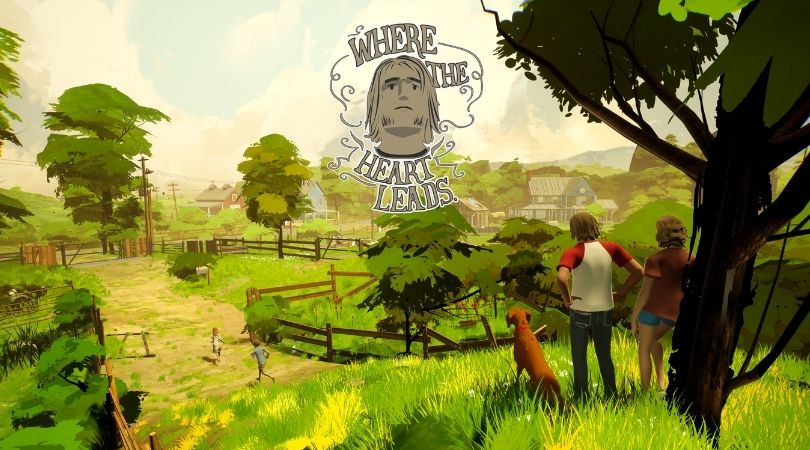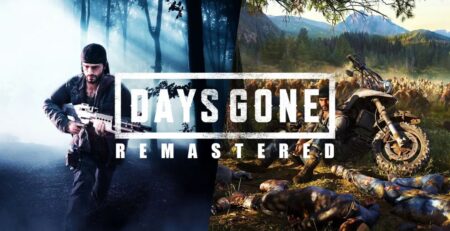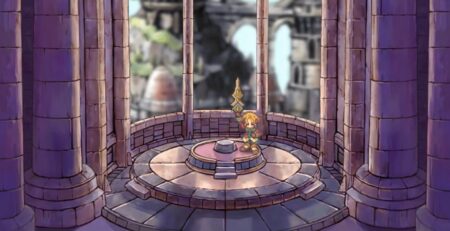
Every day we make thousands of choices. Some feel small, and some feel big, while the impact of others is impossible to predict until long after the choice has been made. There is so much in life outside of our control, despite our most carefully laid plans. In Armature Studio’s surreal narrative adventure game Where the Heart Leads, players are offered the rarest of gifts: the ability to walk alongside the experiences that have defined our lives and truly ask ourselves, “Would I have made a different choice?”
At the game’s start, Whit Anderson’s life as he knows it ends with a bang. Among the crashing of lightning and falling stone, a furious storm rips open an enormous sinkhole right outside of the Andersons’ front door. Stumbling bleary-eyed after his family, Whit arrives on the scene just in time to see the beloved family dog Casey stumble into the crumbling abyss. Jumping into action to save her, Whit climbs into a makeshift swing the family had built using a pulley and an old bathtub and lowers himself into the sinkhole after Casey. But the journey down is much simpler than the journey getting out.
As Whit begins searching for a path back to the surface, things start getting weird. Nestled among the stone and moss at the bottom of the pit are familiar objects and buildings. Whit comes across handwritten notes from his family and pages torn from his journal. Iridescent, ghostly forms of people he’s known and loved spring up, triggering old memories. Cave walls give way to the sunny fields of his family farm in 1978, and as Whit squeezes between two rocks and makes his way towards the light, he’s suddenly seventeen again…
Where the Heart Leads unfolds like a dream, leading the player through phases of Whit’s life, from a teenager on the cusp of adulthood to starting a family and ultimately figuring out the type of man he wants to be. The player explores Whit’s memories, collecting objects and artifacts in a fashion reminiscent of predecessors like Gone Home or Kentucky Route Zero, and eventually discovers through reliving Whit’s life that even his present and future can be changed. But something isn’t quite right. Every other person appears as those same ghostly, iridescent forms, and Whit finds himself continually bumping into a strange man that no one else seems able to see.

It’s a game about relationships and the unmistakable influence we have upon the people closest to us. The game’s core mechanic is centered on choices—pivotal moments where Whit makes a call or doesn’t, that have echoing impacts on himself and his family, not just in the present moment but years into their futures. Dozens of branching paths mean that even choices that feel insignificant can result in new opportunities or unanticipated outcomes several chapters later.
“If you made different choices, you’d be a different person now, and the person you are tends to feel like the person you were always meant to be,” Whit muses to himself at one point in his solitary climb to the surface. “Maybe ‘meant to be’ is just our way of coping with the space we can’t cross between what is and what might have been.” What’s meant to be is entirely up to you in a way that feels more true for Where the Heart Leads than many of its contemporaries. At over 600,000 words, the game’s narrative scope surpasses J.R.R. Tolkein’s The Lord of the Rings trilogy and results in an expansive and unique experience that’s highly personal to each player.
For its cerebral and heady premise, Where the Heart Leads is grounded in the small lives of characters that feel entirely real. Stories of insurmountable debt, struggling to establish a family, reconciling childhood dreams with adult realities, defining for oneself what it means to be an artist, a parent, or a spouse, all play out in the small Midwestern town of Carthage where Whit and his family live. But the game isn’t necessarily out to make statements or cast judgments; it’s more interested in exploring how regular people make sense of and find meaning in their lives in a world that doesn’t offer them the luxury of slowing down.
Whit himself is an artist. Along with his older brother Sege, they utilize found materials to create larger-than-life sculptures as well as help out with construction projects around Carthage. Whit’s gift is execution. He’s skillfully able to see projects through to completion and bring a client’s vision to life, while Sege is the ideas man, always pushing concepts further or dreaming up entirely new compositions.

Unfortunately, for all of Whit’s handiness, the game mostly consists of very simple interactions. The player can run around and interact with people and objects with a single button press. One completes more complicated tasks, like building a barn or constructing a neon sign, by simply holding another button down. If anything, I’d have liked to experience more involvement in Whit’s work, even just repositioning a material or having to rotate an object to get it into place to participate more closely in creating the visions he executes. At times the game can feel like you’re just running around trying to find the right ghostly apparition to talk to move the narrative forward. But these slow moments are few in a game that manages to make existential exploration feel like being wrapped in a comfortable old quilt.
Sometimes things don’t work out the way we want them to. In all of its glorious indifference, the universe can seem to lie in wait for opportunities to twist our meandering paths forward in unexpected directions. Where the Heart Leads is gentle and empathetic in its lesson that adulthood isn’t a place where one arrives. Instead, it’s a process of becoming anchored in the dawning realization that as you get older, demands upon your time only increase—children, careers, bills, obligations—and with it comes the necessity to accept that your time is finite. That we must bloom where we’re planted or risk missing out on our own lives because we’re too busy wishing it was someone else’s. While we all may strive not to live in the past, we all have moments we wish we could do-over. That’s what makes the gift of this game all the more special: it offers an invitation to try again, with the tender reminder that life will never be perfect.
Where the Heart Leads is available July 13th on PS5 and PS4.
Where the Heart Leads
-
Rating - 9/109/10
TL;DR
Sometimes things don’t work out the way we want them to. In all of its glorious indifference, the universe can seem to lie in wait for opportunities to twist our meandering paths forward in unexpected directions. Where the Heart Leads is gentle and empathetic in its lesson that adulthood isn’t a place where one arrives…While we all may strive not to live in the past, we all have moments we wish we could do-over. That’s what makes the gift of this game all the more special: it offers an invitation to try again, with the tender reminder that life will never be perfect.






